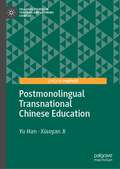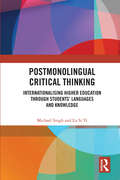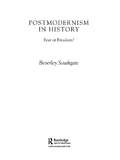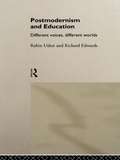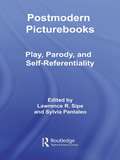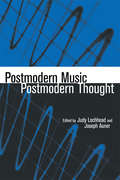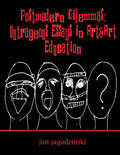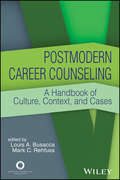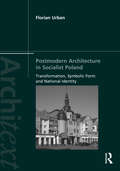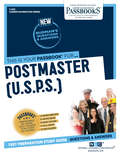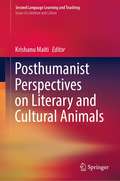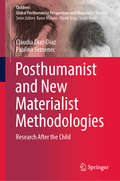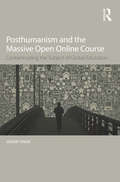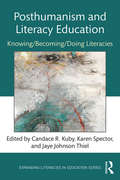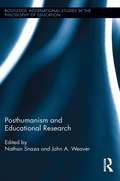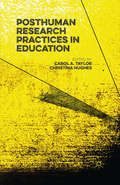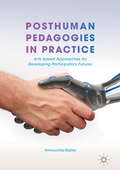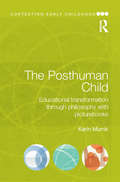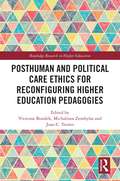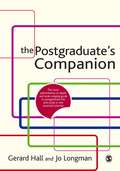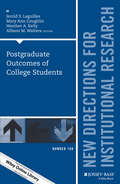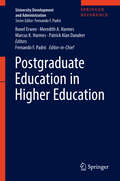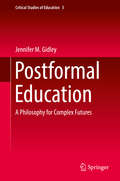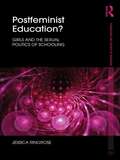- Table View
- List View
Postmonolingual Transnational Chinese Education (Palgrave Studies in Teaching and Learning Chinese)
by Yu Han Xiaoyan JiThis book examines Transnational Chinese Language Education (TCLE) in the Australian context. Taking a post-monolingual perspective, the authors examine Chinese teachers’ monolingual and multilingual practices and mindsets in their educational practices. They find that a Chinese-centric monolingual mindset dominates the Chinese teachers, while a multilingual mindset permeates in their classroom teaching, creating an unconscious tension between the two perspectives. The book proposes that it is the responsibility of teacher educators to train future Chinese teachers with an awareness of this issue, as well as suitable strategies to overcome it and be efficient language teachers. This book will be of interest to applied linguists, pre-service and in-service language teachers, as well as students and scholars of Teaching Chinese to Speakers of Other Languages (TCSOL).
Postmonolingual Critical Thinking: Internationalising Higher Education Through Students’ Languages and Knowledge
by Michael Singh Si Yi LuMaintaining English as the sole language of knowledge production and dissemination in universities that enrol students who speak multiple languages, and those students learning other languages, is questionable. This groundbreaking work calls into question the exclusive use of academic English in internationalising higher education teaching and research. By interrogating the dominant assumptions informing the monolingual mindset, Postmonolingual Critical Thinking indicates that academically literate students can capably use their repertoires of languages and knowledge for educational purposes. The case for students’ languages and knowledge having a place in English-medium universities is made through evidence of the uses of Zhōngwén, academic Chinese. Proposing to broaden the scope of languages used for knowledge production and dissemination, this book highlights the educational potential of multilingualism. Postmonolingual Critical Thinking makes a unique proposal: that universities which recruit doctoral students from Asia create education policy practices that enable them to extend their multilingual capabilities. Arguing that by drawing on intellectual resources from their various languages, students construct knowledge of critical thinking in complex, interesting and potentially innovative ways, this book guides higher education institutions in putting this into practice. It outlines a pragmatic approach for universities to explore the potential of multipolar, multilingual education, while being attentive to the tensions posed by assertions of a monolingual mindset. Postmonolingual Critical Thinking has the potential to create great change in a higher education sector which is mired by a monolingual approach to graduate training. This unique and thought-provoking book is essential reading for those in the fields of applied linguistics, comparative education, higher education, international studies, teacher education and translation studies.
Postmodernism in History: Fear or Freedom?
by Beverley SouthgateThis original and thought-provoking study looks at the context of postmodernist thought in general cultural terms as well as in relation to history. Postmodernism in History traces philosophical precursors of postmodernism and identifies the roots of current concerns. Beverley Southgate describes the core constituents of postmodernism and provides a lucid and profound analysis of the current state of the debate. His main concern is to counter 'pomophobia' and to assert a positive future for historical study in a postmodern world.Postmodernism in History is a valuable guide to some of the most complex questions in historical theory for students and teachers alike.
Postmodernism and Education: Different Voices, Different Worlds
by Richard Edwards Robin UsherIn this book, the authors explore and clarify the nature of postmodernism and provide a detailed introduction to key writers in the field such as Lacan Derrida Foucault Lyotard They examine the impact of this thinking upon contemporary theory and practice of education, concentrating particularly upon how postmodernist ideas challenge existing concepts, structures and hierarchies.
Postmodern Picturebooks: Play, Parody, and Self-Referentiality (Routledge Research in Education)
by Lawrence R. Sipe Sylvia PantaleoOver the past 15 years, there has been a pronounced trend toward a particular type of picturebook that many would label "postmodern." Postmodern picturebooks have stretched our conventional notion of what constitutes a picturebook, as well as what it means to be an engaged reader of these texts. The international researchers and scholars included in this compelling collection of work critically examine and discuss postmodern picturebooks, and reflect upon their unique contributions to both the field of children’s literature and to the development of new literacies for child, adolescent, and adult readers.
Postmodern Music/Postmodern Thought (Studies In Contemporary Music And Culture Ser. #Vol. 4)
by Judy Lochhead Joseph AunerWhat is postmodern music and how does it differ from earlier styles, including modernist music? What roles have electronic technologies and sound production played in defining postmodern music? Has postmodern music blurred the lines between high and popular music? Addressing these and other questions, this ground-breaking collection gathers together for the first time essays on postmodernism and music written primarily by musicologists, covering a wide range of musical styles including concert music, jazz, film music, and popular music. Topics include: the importance of technology and marketing in postmodern music; the appropriation and reworking of Western music by non-Western bands; postmodern characteristics in the music of Górecki, Rochberg, Zorn, and Bolcom, as well as Björk and Wu Tang Clan; issues of music and race in such films as The Bridges of Madison County, Batman, Bullworth, and He Got Game; and comparisons of postmodern architecture to postmodern music. Also includes 20 musical examples.
Postmodern Dilemmas: Outrageous Essays in Art & art Education (Studies in Curriculum Theory Series)
by Jan JagodzinskiIn Postmodern Dilemmas: Outrageous Essays in Art&Art Education and Pun(k) Deconstruction: Experimental Writings in Art&Art Education, jan jagodzinski presents a series of essays covering a timespan of approximately ten years. These essays chart the theory and practice of art&art education as it relates to issues of postmodernity and poststructuralism concerning representation, identity politics, consumerism, postmodern architecture, ecology, phallocentrism of the artistic canon, pluriculturalism, media and technology, and AIDS. As a former editor of The Journal of Social Theory in Art Education and a founding member for the Caucus on Social Theory in Art Education, the author attempts to deconstruct the current art education paradigm, which is largely based on modernist tenets, and to reorient art education practice to social issues as developed in both media education and cultural studies. Part of the intent in these two volumes is to undertake a sustained critique of the 1982 Art in the Mainstream (A.I.M.) statement, which continues to be considered as the core value for art education. The distinct intention of this critique is to put forward a new value base for art&art education in these postmodern times. Many of the essays raise the need to be attentive to sex/gender issues in art&art education and the need to read the artistic discourse "otherwise." There is a sustained critique of the art programs developed by the Getty Center for the Arts, whose arts curriculum presents the paradigm case of late modernist thinking. Some essays are written in a provocative form that tries to accommodate such content. This is particularly the case in Pun(k) Deconstruction, where architectural discourse is deconstructed, and which includes an "artistic performance" given by the author in 1987. This singular set of volumes combines scholarship in the areas of gender studies, aesthetics, art history, art education, poststructuralism, and cultural studies in a unique blend of theory and practice for rethinking the field of art education.
Postmodern Career Counseling: A Handbook of Culture, Context, and Cases
by Louis A. Busacca Mark C. RehfussThis practiced-based handbook describes postmodern career counseling models and methods designed to meet clients’ diverse needs in today’s challenging work environment. Readers will gain a solid understanding of the theoretical underpinnings of postmodern career counseling and learn practical approaches to counseling clients of various ages and backgrounds on occupational choice and other issues, such as coping with developmental tasks, career transitions, and work traumas. Drawing directly from their experiences with clients, career counseling experts link theory to practice in 17 application chapters that demonstrate the process of postmodern career assessment and intervention embedded in culture and context. Multicultural case vignettes and a “Practical Application Guide” in each of these chapters facilitate classroom learning and discussion. *Requests for digital versions from the ACA can be found on wiley.com. *To request print copies, please visit the ACA website here: https://imis.counseling.org/store/detail.aspx?id=78124 *Reproduction requests for material from books published by ACA should be directed to permissions@counseling.org
Postmodern Architecture in Socialist Poland: Transformation, Symbolic Form and National Identity (Architext)
by Florian UrbanGarish churches, gabled panel blocks, neo-historical tenements—this book is about these and other architectural oddities that emerged in Poland between 1975 and 1989, a period characterised by the decline of the authoritarian socialist regime and waves of political protest. During that period, committed architects defied repressive politics and persistent shortages, and designed houses and churches which adapted eclectic historical forms and geometric volumes, and were based on traditional typologies. These buildings show a very different background of postmodernism, far removed from the debates over Robert Venturi, Philip Johnson, or Prince Charles in Western Europe and North America—a context in which postmodern architecture stood not for world-weary irony in an economically saturated society, but for individualised counter-propositions to a collectivist ideology, for a yearning for truth and spiritual values, and for a discourse on distinctiveness and national identity. Postmodern Architecture in Socialist Poland argues that this new architecture marked the beginning of socio-political transformation and at the same time showed postmodernism's reconciliatory potential. In light of massive historical ruptures and wartime destruction, these buildings successfully responded to the contradictory desires for historical continuity and acknowledgment of rupture and loss. Next to international ideas, the architects took up domestic traditions, such as the ideas of the Polish school of historic conservation and long-standing national-patriotic narratives. They thus contributed to the creation of a built environment and intellectual climate that have been influential to date. This book will be of great interest to students and scholars interested in postmodern architecture and urban design, as well as in the socio-cultural background and transformative potential of architecture under socialism.
Postmaster, 1st, 2nd, 3rd Classes: Passbooks Study Guide (Career Examination Series)
by National Learning CorporationThe Postmaster, 1st, 2nd, 3rd Classes (U.S.P.S.) Passbook® prepares you for your test by allowing you to take practice exams in the subjects you need to study. It provides hundreds of questions and answers in the areas that will likely be covered on your upcoming exam.
Posthumanist Perspectives on Literary and Cultural Animals (Second Language Learning and Teaching)
by Krishanu MaitiThis book offers Posthumanist readings of animal-centric literary and cultural texts. The contributors put the precepts and premises of humanism into question by seriously considering the animal presence in texts. The essays collected here focus primarily on literary and cultural texts from varied theoretically informed interdisciplinary perspectives advanced by critical approaches such as Critical Animal Studies and Posthumanism. Contributors select texts that cut across geographical and period boundaries and demonstrate how practices of close reading give rise to new ways of thinking about animals. By implicating the “animal turn” in the field of literary and cultural studies, this book urges us to problematize the separation of the human from other animals and rethink the hierarchical order of beings through close readings of select texts. It offers fresh perspectives on Posthumanist theory, inviting readers to revisit those criteria that created species’ difference from the early ages of human civilization. This book constitutes a rich and thorough scholarly resource on the politics of representation of animals in literature and culture. The essays in this book are empirically and theoretically informed and explore a range of dynamic, captivating, and highly relevant topics. Comprising over 15 chapters by a team of international contributors, this book is divided into four parts:Contestation over Species Hierarchy and CategorizationAnimal (Re)constructionsInterspecies RelationalitiesIntersectionality- Animal and GenderThis book will be essential reading for students and researchers of Critical Animal Studies and Environmental Studies.
Posthumanist and New Materialist Methodologies: Research After the Child (Children: Global Posthumanist Perspectives and Materialist Theories)
by Claudia Diaz-Diaz Paulina SemenecThis book features interviews with 19 scholars who do research with children in a variety of contexts. It examines how these key scholars address research 'after the child’ by exploring the opportunities and challenges of drawing on posthumanist and materialist methodologies that unsettle humanist research practices.The book reflects on how posthumanist and materialist approaches have informed research in relation to de-centering the child, re-thinking methodological concepts of voice, agency, data, analysis and representation. It also explores what the future of research after the child might entail and offers suggestions to new and emerging scholars involved in research with children. Reviewing how posthumanist and materialist approaches have informed authors’ thinking about children, research and knowledge production, the book will appeal to graduate students and emerging scholars in the field of childhood studies who wish to experiment with posthumanist methodologies and materialist approaches.
Posthumanism and the Massive Open Online Course: Contaminating the Subject of Global Education
by Jeremy KnoxPosthumanism and the Massive Open Online Course critiques the problematic reliance on humanism that pervades online education and the MOOC, and explores theoretical frameworks that look beyond these limitations. While MOOCs (massive open online courses) have attracted significant academic and media attention, critical analyses of their development have been rare. Following an overview of MOOCs and their corporate means of promotion, this book unravels the tendencies in research and theory that continue to adopt normative views of user access, participation, and educational space in order to offer alternatives to the dominant understandings of community and authenticity in education.
Posthumanism and Literacy Education: Knowing/Becoming/Doing Literacies (Expanding Literacies in Education)
by Candace R. Kuby Karen Spector Jaye Johnson ThielCovering key terms and concepts in the emerging field of posthumanism and literacy education, this volume investigates posthumanism, not as a lofty theory, but as a materialized way of knowing/becoming/doing the world. The contributors explore the ways that posthumanism helps educators better understand how students, families, and communities come to know/become/do literacies with other humans and nonhumans. Illustrative examples show how posthumanist theories are put to work in and out of school spaces as pedagogies and methodologies in literacy education. With contributions from a range of scholars, from emerging to established, and from both U.S. and international settings, the volume covers literacy practices from pre-K to adult literacy across various contexts. Chapter authors not only wrestle with methodological tensions in doing posthumanist research, but also situate it within pedagogies of teaching literacies. Inviting readers to pause, slow down, and consider posthumanist ways of thinking about agency, intra-activity, subjectivity, and affect, this book explores and experiments with new ways of seeing, understanding, and defining literacies, and allows readers to experience and intra-act with the book in ways more traditional (re)presentations do not.
Posthumanism and Educational Research (Routledge International Studies in the Philosophy of Education)
by John Weaver Nathan SnazaFocusing on the interdependence between human, animal, and machine, posthumanism redefines the meaning of the human being previously assumed in knowledge production. This movement challenges some of the most foundational concepts in educational theory and has implications within educational research, curriculum design and pedagogical interactions. In this volume, a group of international contributors use posthumanist theory to present new modes of institutional collaboration and pedagogical practice. They position posthumanism as a comprehensive theoretical project with connections to philosophy, animal studies, environmentalism, feminism, biology, queer theory and cognition. Researchers and scholars in curriculum studies and philosophy of education will benefit from the new research agendas presented by posthumanism.
Posthuman Research Practices in Education
by Carol A. Taylor Christina HughesHow do we include and develop understandings of those beyond-the-human aspects of the world in social research? Through fifteen contributions from leading international thinkers, this book provides original approaches to posthumanist research practices in education. It responds to questions which consider the effect and reach of posthuman research.
Posthuman Research Practices in Education
by Carol A. Taylor Christina HughesHow do we include and develop understandings of those beyond-the-human aspects of the world in social research? Through fifteen contributions from leading international thinkers, this book provides original approaches to posthumanist research practices in education. It responds to questions which consider the effect and reach of posthuman research.
Posthuman Pedagogies in Practice: Arts based Approaches for Developing Participatory Futures
by Annouchka BayleyThis book investigates transdisciplinary, arts-based approaches to developing innovative and pertinent higher education pedagogy. Introducing timely critical thinking strategies, the author addresses some of the key issues facing educators today in an increasingly complex digital, technological and ecological world. The author combines emerging ideas in the New Materialism and Posthumanism schools of thought with arts-based teaching and learning, including Practice-as-Research, for Social Science contexts, thus exploring how this approach can be used to productively create new pedagogical strategies. Drawing on a rich repertoire of real-life examples, the volume suggests transferrable routes into practice that are suitable for lecturers, researchers and students. This practical and innovative volume will appeal to researchers and practitioners interested in Posthuman and New Materialist theories, and how these can be applied to the educational landscape in future.
The Posthuman Child: Educational transformation through philosophy with picturebooks (Contesting Early Childhood)
by Karin MurrisThe Posthuman Child combats institutionalised ageist practices in primary, early childhood and teacher education. Grounded in a critical posthumanist perspective on the purpose of education, it provides a genealogy of psychology, sociology and philosophy of childhood in which dominant figurations of child and childhood are exposed as positioning child as epistemically and ontologically inferior. Entangled throughout this book are practical and theorised examples of philosophical work with student teachers, teachers, other practitioners and children (aged 3-11) from South Africa and Britain. These engage arguments about how children are routinely marginalised, discriminated against and denied, especially when the child is also female, black, lives in poverty and whose home language is not English. The book makes a distinctive contribution to the decolonisation of childhood discourses. Underpinned by good quality picturebooks and other striking images, the book's radical proposal for transformation is to reconfigure the child as rich, resourceful and resilient through relationships with (non) human others, and explores the implications for literary and literacy education, teacher education, curriculum construction, implementation and assessment. It is essential reading for all who research, work and live with children.
Posthuman and Political Care Ethics for Reconfiguring Higher Education Pedagogies (Routledge Research in Higher Education)
by Vivienne Bozalek Michalinos Zembylas Joan C. TrontoThis book makes an important contribution to ongoing debates about the epistemological, ethical, ontological and political implications of relational ethics in higher education. By furthering theoretical developments on the ethics of care and critical posthumanism, it speaks to contemporary concerns for more socially just possibilities and enriched understandings of higher education pedagogies. The book considers how the political ethics of care and posthuman/new feminist materialist ethics can be diffracted through each other and how this can have value for thinking about higher education pedagogies. It includes ideas on ethics which push those boundaries that have previously served educational researchers and proposes new ways of conceptualising relational ethics. Chapters consider the entangled connections of the linguistic, social, material, ethical, political and biological in relation to higher education pedagogies. This topical and transdisciplinary book will be of great interest for academics, researchers and postgraduate students in the fields of posthuman and care ethics, social justice in education, higher education, and educational theory and policy.
The Postgraduate's Companion
by Jo Longman Gerard HallThe Postgraduate's Companion is the most comprehensive, practical and accessible source of support and guidance for anyone contemplating starting, or already undertaking, their research degree. Hall and Longman's invaluable book is an essential reference resource for anyone doing postgraduate research or thinking of doing it. Leading experts in their fields address the fundamental questions of what a research degree involves; how to choose the best institution; secure an offer; and fund your research degree. For students who are currently working towards a research degree the book deals with the process thoroughly, including coverage of: getting the most from the supervisory relationship planning and writing the thesis navigating and succeeding in research training learning to teach in HE and balancing teaching and research beating the blues and learning how to complete in good time succeeding in the viva voce examination. The final section of the book covers what to do with a research degree once you have one. This includes identifying your skills; staying in academia; research outside academia; leaving research and academia; and starting your own business. SAGE Study Skills are essential study guides for students of all levels. From how to write great essays and succeeding at university, to writing your undergraduate dissertation and doing postgraduate research, SAGE Study Skills help you get the best from your time at university. Visit the SAGE Study Skills hub for tips, resources and videos on study success!
Postgraduate Outcomes of College Students: New Directions for Institutional Research, Number 169 (J-B IR Single Issue Institutional Research)
by Jerold S. Laguilles Mary Ann CoughlinThe post-graduation outcomes of college students are being more widely used as key metrics to demonstrate institutional effectiveness to both external agencies and internal stakeholders. Institutional research offices play an integral role in these data collection efforts. However, underlying challenges exist regarding obtaining an adequate amount of survey responses and salary or earnings information.This volume focuses on the first-destination outcomes (e.g., earnings, employment, graduate/ professional school enrollment) of college graduates while recognizing that other outcomes are also relevant across institutional settings. Through the use of current research, case studies, and best practices, each chapter highlights how postgraduate outcomes information is collected and usedacross the higher education spectrum.In this volume readers will learn: the internal and external demands for these data, the strengths and challenges of their data, and how to best communicate these data to various constituents. This is the 169th volume of this Jossey-Bass quarterly report series. Timely and comprehensive, New Directions for Institutional Research provides planners and administrators in all types of academic institutions with guidelines in such areas as resource coordination, information analysis, program evaluation, and institutional management.
Postgraduate Education in Higher Education (University Development and Administration)
by Ronel Erwee Meredith A. Harmes Marcus K. Harmes Patrick Alan Danaher Fernando F. PadróThis handbook brings together contributors from the United States, Australasia and Europe who use theoretical insights and empirical data to examine current practices as well as possible future directions of postgraduate education. A full range of postgraduate study options are explored, including PhD and professional doctorates, masters awards, and taught coursework programs. The contributions of key stakeholders to the delivery of postgraduate education are addressed, including students, supervisors and university administrators.From this collection, university managers, higher education scholars, and anyone interested in establishing a centre for higher education are given comprehensive overviews of academic leadership, doctoral education, and supervisory relationships. Topics examined in detail in this collection are little discussed in the available literature, including supervisory relationships between colleagues, the emergence of the “second-career academic”, and academic blogging and social networking.The external pressures that universities around the world are experiencing, including neoliberalism, the massification of student numbers, disruptive innovations, and external quality benchmarking, are considered in terms of the ways that they are prompting change in how postgraduate study is administered and delivered. Many chapters contain specific recommendations to meet organisational and student needs, including for specific demographics such as international students or specific programs. The professional, employment, and information literacy needs of students and the professional development of supervisors and processes for examination are also considered.
Postformal Education
by Jennifer M. GidleyThis book explains why the current education model, which was developed in the 19th century to meet the needs of industrial expansion, is obsolete. It points to the need for a new approach to education designed to prepare young people for global uncertainty, accelerating change and unprecedented complexity. The book offers a new educational philosophy to awaken the creative, big-picture and long-term thinking that will help equip students to face tomorrow's challenges. Inside, readers will find a dialogue between adult developmental psychology research on higher stages of reasoning and today's most evolved education research and practice. This dialogue reveals surprising links between play and wisdom, imagination and ecology, holism and love. The overwhelming issues of global climate crisis, growing economic disparity and the youth mental health epidemic reveal how dramatically the current education model has failed students and educators. This book raises a planet-wide call to deeply question how we actually think and how we must educate. It articulates a postformal education philosophy as a foundation for educational futures. The book will appeal to educators, educational philosophers, pre-service teacher educators, educational and developmental psychologists and educational researchers, including postgraduates with an interest in transformational educational theories designed for the complexity of the 21st century. This is the most compelling book on education I have read for many years. It has major implications for all who are in a position to influence developments in teacher education and educational policy. Gidley is one of the very rare scholars who can write intelligently and accessibly about the past, present and future in education. I was challenged and ultimately convinced by her contention that 'what masquerades as education today must be seen for what it is - an anachronistic relic of the industrial past'. Gidley's challenge is to 'co-evolve' a radically new education. All who seek to play a part must read this book. Brian J. Caldwell, PhD, Educational Transformations, former Dean of Education at the University of Melbourne and Deputy Chair, Australian Curriculum, Assessment and Reporting Authority (ACARA)
Postfeminist Education?: Girls and the Sexual Politics of Schooling (Foundations and Futures of Education)
by Jessica RingroseThis book challenges a contemporary postfeminist sensibility grounded not only in assumptions that gender and sexual equality has been achieved in many Western contexts, but that feminism has gone ‘too far’ with women and girls now overtaking men and boys - positioned as the new victims of gender transformations. The book is the first to outline and critique how educational discourses have directly fed into postfeminist anxieties, exploring three postfeminist panics over girls and girlhood that circulate widely in the international media and popular culture. First it explores how a masculinity crisis over failing boys in school has spawned a backlash discourse about overly successful girls; second it looks at how widespread anxieties over girls becoming excessively mean and/or violent have positioned female aggression as pathological; third it examines how incessant concerns over controlling risky female sexuality underpin recent sexualisation of girls' moral panics. The book outlines how these postfeminist panics over girlhood have influenced educational policies and practices in areas such as academic achievement, anti-bullying strategies and sex-education curriculum, making visible the new postfeminist, sexual politics of schooling. Moving beyond media or policy critique, however, this book offers new theoretical and methodological tools for researching postfeminism, girlhood and education. It engages with current theoretical debates over possibilities for girls’ agency and empowerment in postfeminist, neo-liberal contexts of sexual regulation. It also elaborates new psychosocial and feminist Deleuzian methodological approaches for mapping subjectivity, affectivity and social change. Drawing on two UK empirical research projects exploring teen-aged girls’ own perspectives and responses to postfeminist panics, the book shows how real girls are actually negotiating notions of girls as overly successful, mean, violent, aggressive and sexual. The data offers rich insight into girls’ gendered, raced and classed experiences at school and beyond, exploring teen peer cultures, friendship, offline and online sexual identities, and bullying and cyberbullying. The analysis illuminates how and when girls take up and identify with postfeminist trends, but also at times attempt to re-work, challenge and critique the contradictory discourses of girlhood and femininity. In this sense the book offers an opportunity for girls to ‘talk back’ to the often simplistic either wildly celebratory or crisis-based sensationalism of postfeminist panics over girlhood. This book will be essential reading for those interested in feminism, girlhood, media studies, gender and education.
